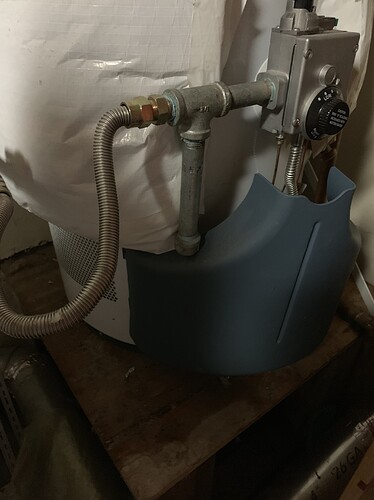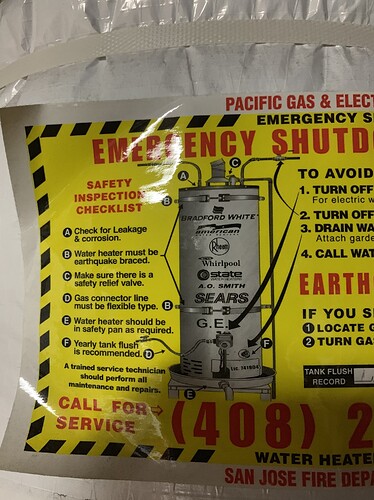My garage has vents–like probably a lot of other garages. And right now, it’s pretty humid in my garage…and I’m wondering why I’m letting all the humidity into my garage… It’s not like my house has holes to let the air in at all times. My windows are closed when it’s wet out. So why does my garage have vents and what bad thing will happen if I cover them up and install a dehumidifier in my garage???
Is it to prevent gas leak and carbon monoxide poisoning?
It’s rare to have a humid garage. Vent should help with venting literally
It’s easier to have the vents vs having yet another thing (dehumidifier) to run ? Also you most definitely should not remove the flue vent which is from your water heater/furnace.
The thing is I think it’s vents+dehumidifier because that’s how the humidity is getting in. Unless I have a leak somewhere.
And yes, the water heater’s in the garage, but it does have it’s own flue. I’m talking about the 3x12 holes with wire mesh that are near the ground.
[Edit–Ok. I see i said “cover them up and install a dehumidifier”–I guess I’m hoping to cover them and not need the dehumidifier]
Is your furnace / water heater in the garage? If so, code requires a certain amount of venting space in order to support them (iirc)
Yes, but it has it’s own flue. Only thing I don’t know is if it has a fan.
I used to have vents in my garage door when my water heater was inside my garage. Later, I relocated my water heater to a different area in the house with its own independent intake and exhaust pipes, going to the roof, Covered with a non-flammable material. Now, my new garage door, which has been inspected for code compliance, does not have any vents. Hope this helps.
You need combustion air flow
With the required smoke/CO2 alarms in place - I think one can use less vents in the garage if the heater and furnace have their separate air vents. Unless the air vents are part of the crawl-space - I would keep them in place.
Detectors are not preventative and they are useless other than reminding people. Vent can prevent or reduce the hazard.
By code you need to have vents in your garage so there’s air flow as elt1 and others said. There’s if, or. And, most of people, ignoring dangerous things happen use the flue for airing and for their dryer too. Not good!
Plus having newer electric/plug-ins vehicle will further lessen the amount of garage vents needed…
We built our new home a couple years ago.
It was one of those energy-efficient new houses – There were no vents inside the garages (there were two garages.) In fact, all the walls and garage doors were insulated, the garages were almost air tight (if all doors were closed.)
The house passed all the city inspections, so I guess my builder knew what they were doing…
Just some notes:
- Our tankless water heater is not in the garage, it is on 2nd floor inside the laundry room.
- There is a side-door in one the garages to walk out to the side yard.
- There is a 240V 50Amp receptacle inside the garage, with a Level II charger for EV vehicle.
- It is pre-pumped for a sink, with hot and cold water faucets.
- There is an electrical panel inside the garage for the 15 Amp (or 20 Amp? I forgot) circuits, but there is another electrical panel (outdoor on the side wall, facing the side yard) for bigger circuits (e.g. A/C, 240V, etc.)
Anything is under a present code. The code that was applied on your home years ago may not be suitable for another new home.
Basically, you don’t need vents in your garage if there’s no water heater. Right?
An hour ago, our water wasn’t that hot so I had to flush the water from the water heater as I’ve done every year. But reading the instructions that they send you every year for your water heater, I read “blah, blah, and it has to be set on a pan”? Our home was remodeled by the city of San Jose with all the yada, yada inspections from the HUD and so on in 2012
I hope you get what I am trying to explain when you see these pictures. City codes change once in a while.
Platform is fine if you don’t mind water all over your garage 
New code require water heater on a raised platform, it must have some advantage
Well, it got all wet around it last night.
It reminds me of the day, many years ago, that I got drunk and snuck in into my apartment. I swear that I saw myself lifting the lid on the toilet when I peed.
Next day, my then girlfriend pulls me from my ear and drags me to the center of the living room. There, the center table, with a glass top on it, had a circular wet stain around it. ![]()
![]()
![]()
![]()
The water heater is, or should be on a platform (gas water heater) because gas fumes from your gas tank are heavier than air so the fumes will not ignite from the water heater flames
The installation of a dehumidifier in a garage can be a useful method for regulating humidity levels and improving indoor air quality. It is important to consider several factors when installing a dehumidifier in a garage to ensure the process is safe and effective. These include electrical safety, proper ventilation, and regular maintenance. It is not recommended to cover the vents in the garage and rely solely on the dehumidifier to control humidity levels, as this can lead to an increase in humidity and the potential for mold and other moisture-related issues. Instead, it is advisable to use the dehumidifier in conjunction with the vents and maintain it regularly to ensure optimal operation. By following these guidelines, it is possible to safely and effectively utilize a dehumidifier in a garage.

